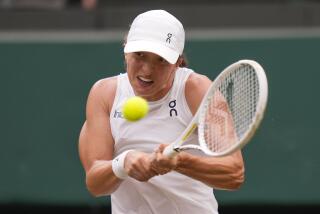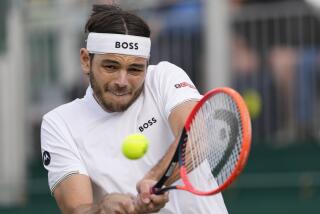HOME AWAY FROM HOME
- Share via
WIMBLEDON, England — When Pete Sampras playfully tossed a ball in the air, pretending to take aim at a lost, dive-bombing pigeon, the Centre Court audience laughed at his gesture in the second set on Monday at Wimbledon.
In the United States, the crowd would wonder how he could have missed the bird.
When Sampras hit an exquisite backhand half-volley on match point--a beguiling shot delivered with a delicate touch of sidespin, spectators at the All England Club were duly impressed and BBC television commentators used the word “magical” to sum up his convincing performance.
In the United States, someone would probably complain it wasn’t an ace.
Sampras may not be home, not literally, but he feels that way at Wimbledon. The five-time champion is accepted, appreciated and understood in England. Even his struggles--the French Open failures--give him an air of vulnerability when he tries, and succeeds, in pulling his year together on grass.
This yearly ritual was vividly illustrated by his businesslike dismissal of Australia’s Scott Draper, a 6-3, 6-4, 6-4 first-round victory in 89 minutes at Wimbledon.
Sampras delivered 12 aces, did not face a single break point and hit 24 winners off the ground to Draper’s three. And the 75th-ranked Draper is hardly a slouch on grass, having won Queen’s last year. He also beat Boris Becker earlier this month at Queen’s in the second round.
These modest accomplishments were no match for the top-seeded Sampras, once he reclaimed ownership of Centre Court.
“I felt like I was back home on that court,” Sampras said. “I couldn’t ask for a better start.”
Here, his problems melt away. The transformation from clay-court bumbler to grass-court genius is always something to behold. Even persistent Sampras critics turn warm and fuzzy in England.
“Pete Sampras has probably got at least three, four [more] genuine shots at Wimbledon before he calls it a day,” television commentator John McEnroe said. “Ten titles? You never know.
“I think he could take the rest of the year off and still have a shot at winning Wimbledon.”
And unlike the United States, there are no cable-television specials here, calling him boring and hurting his feelings. Instead, during a recent chat with five writers at a tennis club in London, there was this exchange with one British writer after Sampras began speaking about his exhausting 1998, specifically, the landmark achievement of finishing No. 1 at the end of the year for the sixth consecutive year:
Sampras: “It’s one of my greatest achievements, being able to do that for so long. I surprise myself. I didn’t think I would ever do this in the game.”
Reporter: “It’s one of the greatest achievements in any sport. I’m not asking you that, I’m telling you.”
Sampras and the five writers all laughed.
“I tend to agree,” Sampras said. “Thanks.”
Meanwhile, at home, he is on the cover of a major sports magazine, with the headline: “Portrait of a (Ticked Off) Champion.”
But Sampras is hardly an angry young man, merely one who is uncomfortable with the American cult of celebrity.
“The concept is partially true,” said Paul Annacone, the longtime coach of Sampras. “He’s not angry. He genuinely would like to be thought of as a great tennis player and he wishes that was enough.
“I think the last five to seven years, so much of the onus of tennis, has been put on entertainment. He feels like he missed out because he is a normal guy who has just won a million titles.
“There’s nothing else there. He doesn’t want to sit in the front row of [movie] premieres. I just think he’s 30 years too late. He should be playing in the ‘60s. He doesn’t really have all the other baggage that goes along with today’s sports, which is entertainment.”
Sampras even makes a point in many of his interviews of joking about being called boring. It might be a good defense, but if you spend any time around Sampras, boring is not a fair adjective. His sense of humor is subtle, especially when he is taking a shot at Greg Rusedski, whom Sampras has kidded ever since the Canadian used his British citizenship to ingratiate himself with fans at Wimbledon.
In fact, Sampras said his levelheaded nature has helped him stay at the top for such a long time. Other players seem to treat No. 1 like a jinx.
“If anything, it shows how difficult it is,” Sampras said. “When you’re No. 1, you are the man to beat. A lot of guys have not handled the pressure that well. It’s a new beginning for someone like Yevgeny [Kafelnikov] or Carlos [Moya].
“I’ve always been comfortable being No. 1. For Yevgeny to get there and all of a sudden, he feels he has the weight of the world on his shoulders, it’s not easy to deal with.
“My personality and the way I am--it helps me cope with it. You might think I’m boring. The fact I don’t say much or do much, it helps. When I play tournaments and Grand Slams, headlines aren’t what I want. It’s always been about holding up the cup.”
His levelheaded nature has been tested in 1999. He skipped the Australian Open and suffered other setbacks because of injuries. Since winning Wimbledon last year, Sampras has won only two titles, at Vienna in October and Queen’s Club earlier this month. Additionally, his two-year relationship with actress Kimberly Williams ended before the French Open.
“It’s been a great year in terms of learning,” Annacone said. “You can look it at like, ‘Woe is me, or here’s another part of my life I’m going to have to deal with and move on.’
“Whether it be social relationships, or Pete purely learning to deal with losing a little better, those things, to me as his coach, as sad as it is about Kimberly, are things that actually make you better and stronger. It’s a big cliche but it’s true.
“Pete’s the one who has told me, ‘It’s easy to judge people when they’re doing well. See how they act when they’re doing poorly.’ I keep reminding him of that through this.”
The latest French Open loss particularly stung Sampras. Afterward, he spent a week with Annacone and his family in New York to “let the wounds start to heal,” Annacone said. They had several heart-to-heart talks and Sampras decided to rejoin the U.S. Davis Cup squad.
“I think I put too much pressure on myself,” Sampras said. “The fact I’ve won all these other majors, and not the French, I’m going out in Paris thinking too much about it, talking too much about it.
“I was kind of consumed with it. I play my best tennis when I just go out and play. That’s the way I treat Wimbledon and the Open. That’s when I’m at my best, when I’m not thinking.”
Said Annacone: “There’s no magic pill. There’s nothing missing. Now he knows he has to do certain things to help implement that, mostly being natural and instinctive.”
They talked of many things, including his legacy. At 27, Sampras is looking ahead. He got the record of finishing No. 1 for six straight years, and only now is talking about the toll it took on his body and mind.
“The last two months of last year, I was pretty miserable to be honest with you,” he said. “I was going through a hard time. I wasn’t sleeping well. I was miserable. It made me think, ‘I’m not fighting for my life here. This is a game.’ Each week got tougher and tougher.
“I lost to [Richard] Krajicek and Rusedski. It was too much for me. As much as I can take pressure . . . it’s different than a Grand Slam, a career achievement, I didn’t want to blow it.”
Sampras would have never been in position to surpass Jimmy Connors’ record without Wimbledon in 1998. For this is where he salvaged his year, and in 1999, that knowledge is somewhat comforting.
“In order to play well at the Slams, you have to play well during the year,” he said. “You just can’t turn it on and off like a light switch.
“I’ve done it before, but in some ways you have to be realistic. I’m not going to win Wimbledon every year.
“But I feel if I prepare well, there’s no question I can’t do it again. I’ve been in big matches and certainly love Wimbledon. It certainly brings out something great in me.”
WHY WITHDRAW? HBO’s Martina Navratilova and Billie Jean King were among those questioning Serena Williams’ withdrawal from Wimbledon. Page 9
More to Read
Go beyond the scoreboard
Get the latest on L.A.'s teams in the daily Sports Report newsletter.
You may occasionally receive promotional content from the Los Angeles Times.











